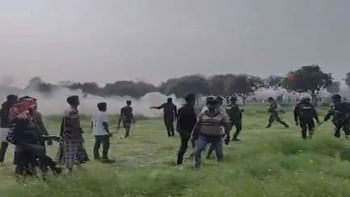Israeli security cabinet okays Gaza truce deal

- Gaza health ministry says 88 killed in 24 hours
- WHO upbeat on scaling up aid under ceasefire terms
- Death toll in Gaza rises to 46,876
The Israeli security cabinet has ratified the Gaza ceasefire and hostage return deal, ahead of a full cabinet meeting expected later yesterday, a statement from the prime minister's office said.
Prime Minister Benjamin Netanyahu said the deal is expected to take effect on Sunday (tomorrow), with the release of the first hostages by Hamas.
If successful, the ceasefire would halt fighting between Hamas and Israeli forces that has razed much of heavily urbanised Gaza, killed at least 46,876 people, and displaced most of the enclave's pre-war population of 2.3 million several times over, according to local authorities.
It could also ease hostilities in the Middle East, where the Gaza war spread to include Iran and its proxies - Lebanon's Hezbollah, Yemen's Houthis and armed groups in Iraq as well as the occupied West Bank.
In Gaza itself yesterday, Israeli warplanes kept up heavy strikes, and the Civil Emergency Service said that at least 101 Palestinians, including 58 women and children, had been killed since the deal was announced on Wednesday.

Under the six-week first phase of the three-stage deal, Hamas will release 33 Israeli hostages, including all women (soldiers and civilians), children, and men over 50.
Israel will release all Palestinian women and children under 19 detained in Israeli jails by the end of the first phase. The total number of Palestinians released will depend on hostages released, and could be between 990 and 1,650 Palestinians, including men, women and children.
Hamas said in a statement yesterday that obstacles that arose in relation to the terms of the Gaza ceasefire agreement have been resolved.
A World Health Organization official said yesterday it should be possible to scale up aid imports into Gaza massively to about 600 trucks a day under the terms of the deal.
The aid surge requires more than a 10-fold daily increase in lorries from the daily average of 51 that UN data shows entered the enclave in early January.
"I think the possibility is very much there and specifically when other crossings will be opened up," Rik Peeperkorn, WHO representative for the Occupied Palestinian Territory, told a press briefing in Geneva. "This can be built up very rapidly."
In Gaza, the airstrikes continued. In the aftermath of one strike on tents housing displaced people, a boy picked through damaged items on the floor that was littered with canned food and coffee pots.
That attack killed two people and wounded seven at an encampment close to Nasser Hospital in Khan Younis, according to medics.
Also in Khan Younis, mourners gathered around the body of a man killed in an Israeli strike as women hugged each other and cried. "Life has become an unbearable hell," said resident Jomaa Abed al-Aal.


 For all latest news, follow The Daily Star's Google News channel.
For all latest news, follow The Daily Star's Google News channel. 



Comments